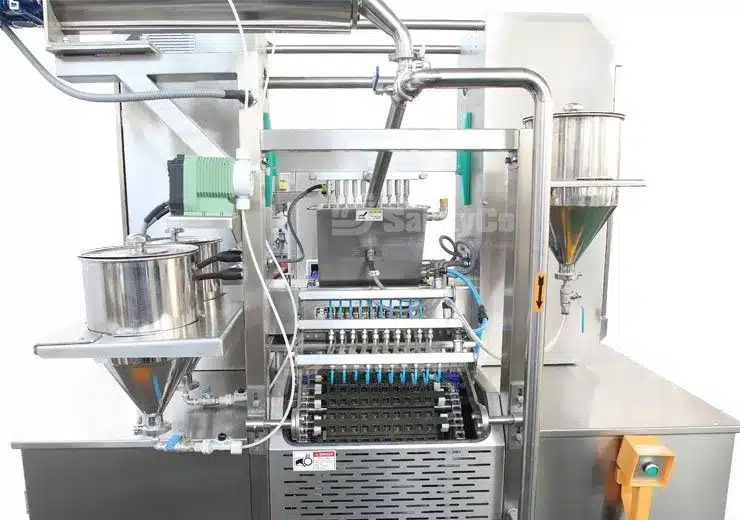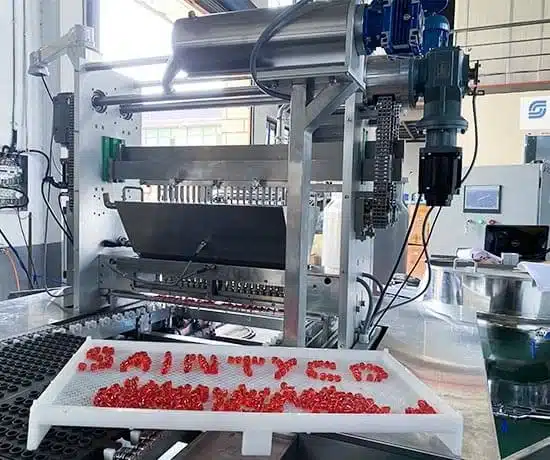In the fast-paced world of gummy manufacturing, staying ahead of the competition requires more than just advanced machinery.
To effectively train your workforce on automated gummy manufacturing machines, focus on comprehensive program design, diverse learning methods, hands-on experience, safety protocols, and continuous improvement. This holistic approach ensures your team is equipped to operate efficiently and safely.
While understanding the basics is essential, diving deeper into each aspect of workforce training can significantly enhance productivity and product quality. Let's explore these strategies in detail.
Hands-on experience is crucial for training on gummy machines.True
Practical training enhances skill retention and operational efficiency.
Safety protocols are optional in gummy manufacturing training.False
Safety protocols are mandatory to prevent accidents and ensure compliance.
How to Design an Effective Training Program for Gummy Manufacturing?
Designing an effective training program for gummy manufacturing ensures safety, efficiency, and quality. This comprehensive guide helps you equip your team with the necessary skills to operate sophisticated machinery effectively.
An effective training program for gummy manufacturing involves assessing current skills, setting clear objectives, employing diverse learning methods, and emphasizing safety. It should be tailored to address specific equipment and operational needs.
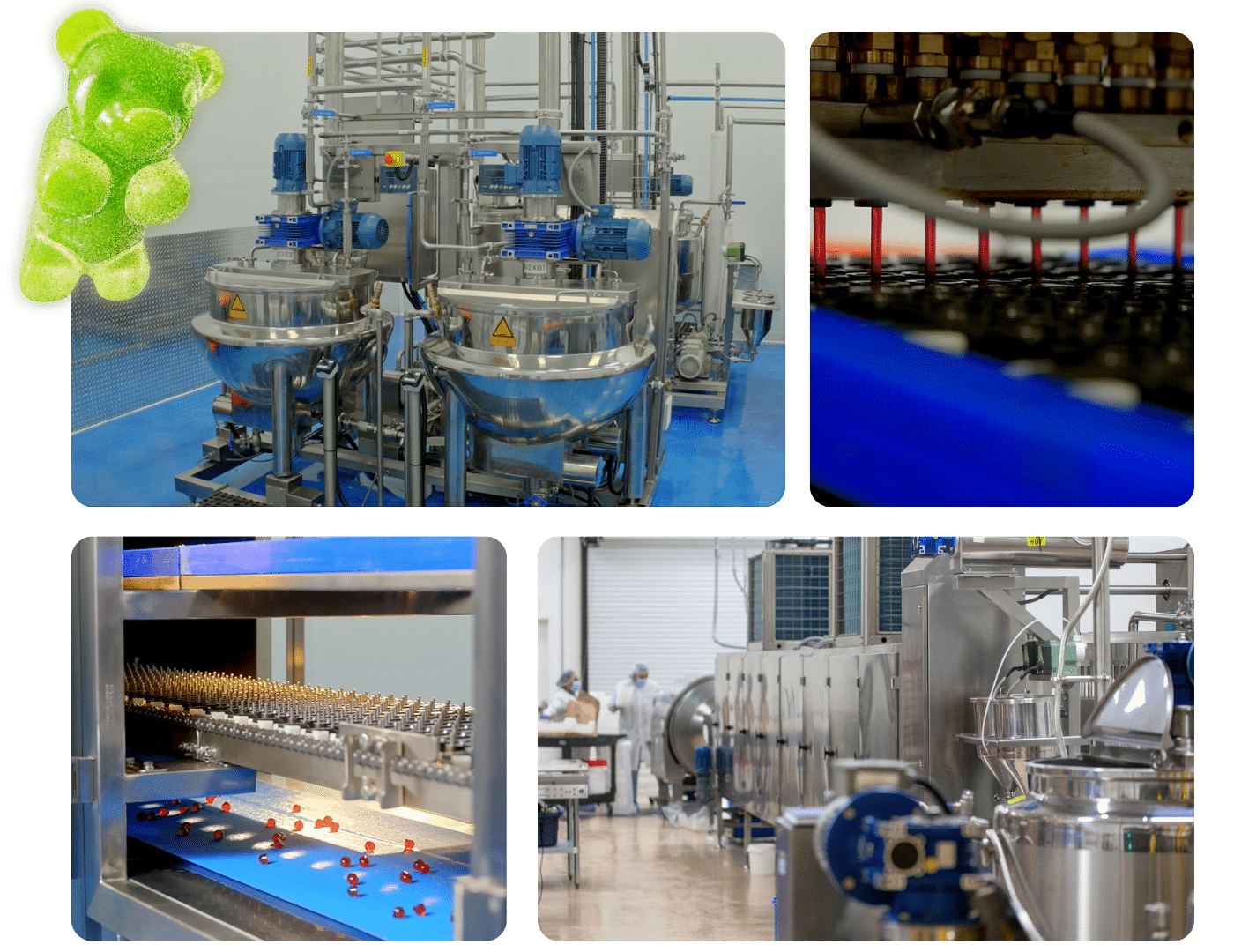
Understanding Training Needs
Before designing a training program, conduct a thorough Training Needs Analysis (TNA). This involves assessing the current skills of your workforce and identifying gaps in knowledge, particularly in operating advanced gummy production equipment like PLC touch controls1 and auto-dosing systems.
Training Needs Analysis Steps
| Step | Description |
|---|---|
| Skills Assessment | Evaluate existing skill sets and identify gaps. |
| Equipment Proficiency | Focus on key features such as cooling belts. |
| Set Objectives | Define clear performance goals and metrics for success. |
Diverse Learning Methods
Implement multi-format training delivery options to accommodate various learning preferences. Hands-on sessions, live demonstrations, and virtual simulations can be integrated to enhance understanding. Additionally, use self-paced video tutorials for machine-specific Standard Operating Procedures (SOPs).
Learning Methods Overview
- Hands-on Sessions: Real-time experience with equipment.
- Virtual Simulations: Troubleshooting exercises.
- Interactive Modules: Quizzes and role-playing for safety protocols.
Consider incorporating real-world scenarios that your team might encounter during operations, such as adjusting cooling tunnel parameters or oil spraying systems. These interactive training modules2 not only reinforce understanding but also prepare employees for practical challenges.
Emphasizing Safety and Compliance
Safety should be a cornerstone of any training program. Training sessions must emphasize critical safety features like servo alarms, emergency stop buttons, and hygienic design to prevent accidents. Furthermore, employees should be trained in the proper handling of food-grade materials and adherence to industry standards such as CE and FDA.
Key Safety Features
- Servo Alarms: Immediate alerts for operational issues.
- Emergency Stop Buttons: Quick response to emergency situations.
- Hygienic Design: Ensures cleanliness and compliance.
Continuous Improvement through Feedback
Finally, establish feedback mechanisms that allow for regular reviews of training effectiveness. Consider setting up periodic refresher courses to address any common operational issues such as cooling inconsistencies or dosing adjustments. Encourage ongoing learning by including new technology integration in your training updates3. By maintaining a culture of continuous improvement, you ensure your team remains adept at handling both current and future challenges in gummy manufacturing.
Training needs analysis includes setting performance goals.True
Setting objectives is a crucial part of the Training Needs Analysis.
Safety features include servo alarms and emergency stop buttons.True
Servo alarms and emergency stops are key safety components in training.
What Learning Methods Enhance Employee Engagement in Training?
Engaging employees during training is crucial for ensuring knowledge retention and skill application. Explore effective learning methods that enhance participation, making sessions dynamic and impactful.
Incorporate interactive elements such as hands-on activities, real-life scenarios, and multimedia presentations to boost employee engagement in training. These methods cater to various learning styles, ensuring a comprehensive understanding and increased retention.
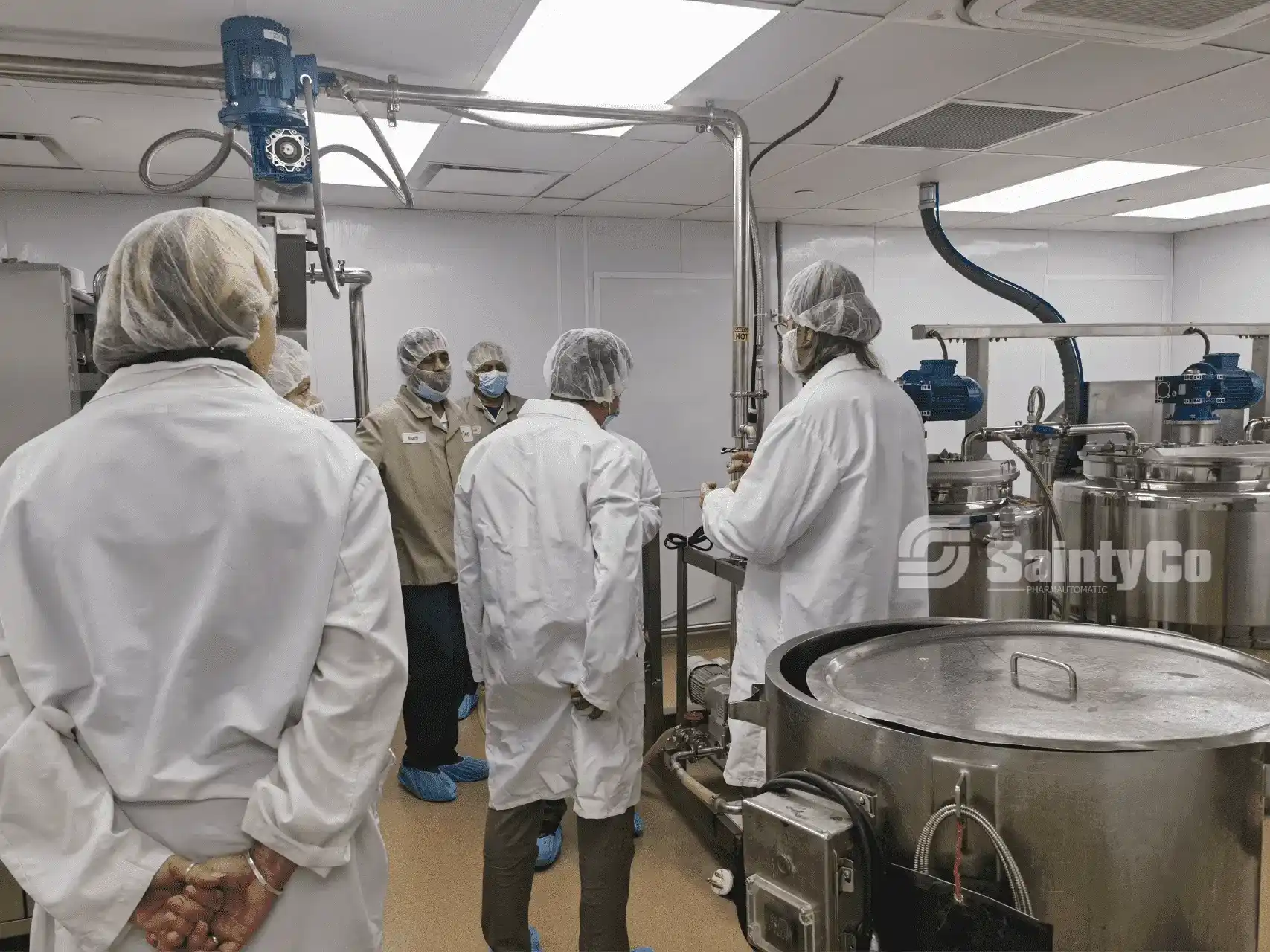
Interactive Training Techniques
Implementing interactive training methods can significantly increase employee engagement. Techniques like real-world scenarios4 allow learners to apply knowledge in a simulated environment. This practical approach not only boosts confidence but also enhances problem-solving skills.
Quizzes and role-playing are other effective strategies. They encourage active participation and provide immediate feedback, reinforcing learning outcomes. Additionally, role-playing helps employees understand different perspectives, fostering empathy and teamwork.
Multimedia and Technology Integration
Utilizing multimedia elements in training can capture the attention of diverse learners. Videos, animations, and interactive modules cater to visual and auditory learning preferences, making complex concepts more accessible.
Virtual simulations, for instance, allow employees to practice skills without real-world consequences. This method is particularly useful in industries where errors can be costly or dangerous. For an effective setup, consider platforms like immersive learning technologies5.
Hands-On Learning Opportunities
Hands-on experience remains one of the most effective ways to engage employees in training. Offering practical sessions where employees can directly interact with equipment or software ensures they gain confidence in their abilities.
In industries like manufacturing, supervised practice sessions help reinforce theoretical knowledge through real-world application. This approach also allows trainers to provide personalized feedback and support.
Collaborative Learning Environments
Creating a collaborative learning environment encourages employee interaction and peer learning. Group discussions and team projects foster communication skills and encourage diverse perspectives.
Incorporating platforms that facilitate remote collaboration can enhance this method, especially for geographically dispersed teams. Consider tools that offer real-time communication and file-sharing capabilities, such as online collaboration software6.
| Method | Benefits |
|---|---|
| Interactive Scenarios | Boosts confidence, enhances problem-solving |
| Multimedia | Caters to various learning styles |
| Hands-On Experience | Reinforces theoretical knowledge |
| Collaborative Projects | Encourages communication and teamwork |
Interactive training methods increase employee engagement.True
Interactive methods like scenarios and role-playing boost engagement by fostering active participation.
Multimedia elements do not affect learning outcomes.False
Multimedia caters to diverse learning styles, enhancing understanding and retention.
Why Is Hands-On Experience Critical in Gummy Machine Operation Training?
In the realm of machine operation, theoretical knowledge is foundational, but hands-on experience is transformative. It bridges the gap between knowing and doing, enabling operators to confidently manage complex machinery.
Hands-on experience in machine operation training is crucial as it enhances practical skills, ensures safety, and boosts efficiency. It allows operators to apply theoretical knowledge in real-world settings, leading to better machine handling and reduced errors.
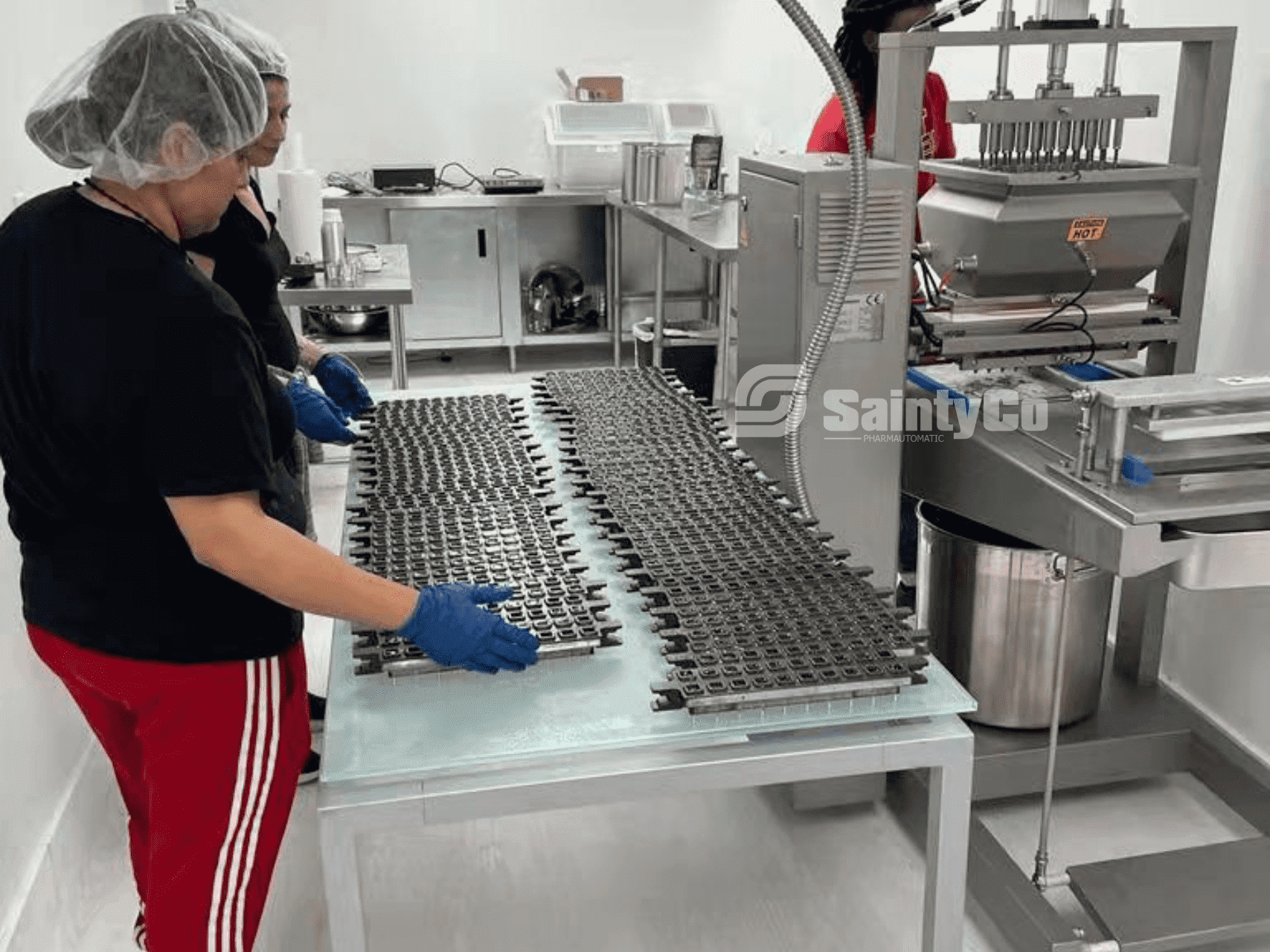
Understanding Machine Complexity
Machines today are sophisticated and require more than just theoretical knowledge to operate. Practical experience helps operators understand complex systems like PLC touch controls7 and auto-dosing systems, making them adept at handling real-world challenges.
Bridging Theory and Practice
Theoretical learning provides a baseline understanding of machinery. However, without hands-on practice8, operators may struggle to apply this knowledge effectively. By working directly with machines, they can see firsthand how theories translate into practice.
Enhancing Safety Protocols
Training in a controlled environment allows operators to become familiar with safety features, such as emergency stop buttons and automated alarms. This familiarity can significantly reduce the risk of accidents and ensure compliance with industry standards.
Boosting Confidence and Efficiency
Operators who undergo hands-on training gain confidence in their ability to manage equipment. This confidence leads to improved operational efficiency9 as they can troubleshoot issues swiftly and execute tasks accurately.
| Benefits | Description |
|---|---|
| Skill Enhancement | Real-world application of learned skills. |
| Safety Assurance | Familiarity with safety protocols reduces risk of accidents. |
| Efficiency Improvement | Faster problem-solving and task execution. |
| Confidence Building | Comfort in operating complex machinery promotes a proactive work approach. |
Mentorship and Continuous Learning
Pairing new operators with experienced mentors during training can facilitate knowledge transfer and foster a culture of continuous learning. It encourages the sharing of insights and tips that are not typically covered in theoretical sessions.
For example, integrating real-world scenarios in training modules helps in understanding how to adjust parameters for optimal performance. Implementing quizzes and role-playing activities can reinforce this understanding effectively.
By cultivating an environment that values both theoretical and practical learning, organizations can prepare their teams to tackle complex challenges with competence and assurance.
Hands-on training improves machine safety compliance.True
Practical training familiarizes operators with safety protocols, reducing accident risks.
Theoretical knowledge alone is sufficient for machine operation.False
Without practical experience, operators struggle to apply theoretical knowledge effectively.
How Can You Ensure Safety and Compliance in Your Training Programs?
Training programs are pivotal in ensuring workplace safety and regulatory compliance. Implementing strategic training initiatives helps prevent accidents and aligns your operations with industry standards. How can you optimize your training to achieve these goals?
To ensure safety and compliance in training programs, establish clear safety protocols, use diverse learning methods, conduct regular assessments, and stay updated on industry regulations. Implementing these strategies helps create a safer work environment.
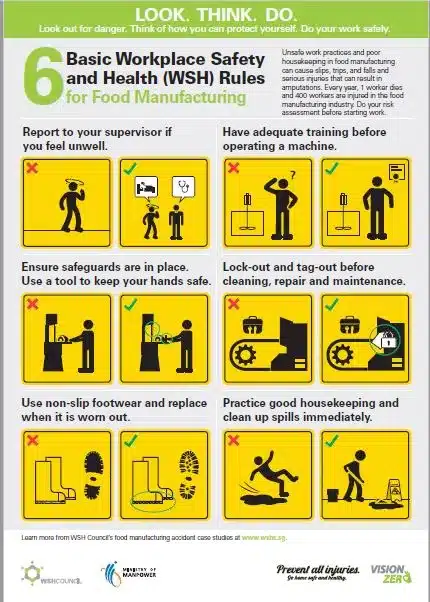
Establish Clear Safety Protocols
Safety protocols are the backbone of any effective training program. Begin by identifying the specific hazards associated with your operations. Develop comprehensive safety procedures10 that address these risks. Ensure all employees are familiar with these protocols through regular safety drills and emergency response training.
Use Diverse Learning Methods
Diverse learning methods cater to different learning styles, making training more effective. Incorporate hands-on practice, video tutorials, and interactive modules into your training programs. For instance, virtual reality simulations can help employees understand complex safety scenarios11 without real-world risks.
Conduct Regular Assessments
Regular assessments ensure that employees understand safety protocols and can apply them effectively. Use quizzes, practical demonstrations, and peer reviews to evaluate their proficiency. This approach helps identify areas needing improvement and ensures continuous skill enhancement12.
| Assessment Type | Frequency | Purpose |
|---|---|---|
| Quizzes | Monthly | Test theoretical knowledge |
| Practical Demonstrations | Quarterly | Evaluate application of skills |
| Peer Reviews | Bi-annual | Foster a culture of collaborative learning |
Stay Updated on Industry Regulations
Industry regulations are constantly evolving. Keeping abreast of these changes is crucial for maintaining compliance. Attend industry seminars, subscribe to regulatory updates, and network with other professionals to remain informed about new compliance standards13. This proactive approach helps you adapt your training programs to meet current requirements.
By focusing on these key areas, you ensure that your training programs not only comply with industry standards but also foster a safer work environment for all employees.
Safety protocols are essential for effective training programs.True
Safety protocols address specific hazards, ensuring employee safety.
Regular assessments are unnecessary for skill enhancement.False
Assessments identify improvement areas, ensuring continuous skill enhancement.
What Role Does Continuous Improvement Play in Workforce Training?
Continuous improvement is the backbone of effective workforce training. It ensures that training programs evolve to meet changing industry demands, fostering a skilled and adaptable workforce.
Continuous improvement in workforce training involves regularly updating and refining training methods to enhance employee skills and productivity. It encourages a culture of learning and adaptability, crucial for staying competitive.

The Foundation of Continuous Improvement
Continuous improvement in workforce training is rooted in the philosophy of Kaizen14, a Japanese term meaning 'change for better.' It emphasizes incremental changes and ongoing efforts to enhance processes. This approach ensures that training programs remain relevant and effective in addressing the ever-evolving needs of the industry.
Benefits of Continuous Improvement
- Enhanced Skill Development: By continuously updating training materials, employees are always equipped with the latest knowledge and skills.
- Increased Engagement: Employees feel valued and motivated when they see investment in their development.
- Improved Performance Metrics: Regular feedback and updates help in aligning employee skills with organizational goals.
| Benefit | Description |
|---|---|
| Enhanced Skill Development | Regular updates to training materials ensure relevance |
| Increased Engagement | Investment in development boosts morale |
| Improved Performance Metrics | Aligns skills with organizational goals |
Implementing Continuous Improvement in Training
- Feedback Mechanisms: Encourage open communication through regular surveys and feedback sessions15. This will help identify areas for improvement.
- Technology Integration: Use e-learning platforms and virtual simulations to create interactive and engaging training modules. Digital tools16 can be pivotal in delivering updated content efficiently.
- Ongoing Assessments: Regular evaluations help gauge the effectiveness of the training programs and provide insights into necessary adjustments.
- Collaborative Learning: Foster a culture where employees can learn from each other through peer-to-peer mentorship programs17.
Challenges and Solutions
While continuous improvement offers numerous benefits, it also presents challenges such as resistance to change and resource constraints. Overcoming these requires a strategic approach:
- Resistance to Change: Engage employees by clearly communicating the benefits of continuous improvement.
- Resource Constraints: Leverage cost-effective digital solutions to keep updates frequent without exceeding budget limits.
By embracing a continuous improvement mindset, organizations can create a dynamic and resilient workforce capable of meeting today's challenges head-on.
Continuous improvement is based on the Kaizen philosophy.True
Kaizen emphasizes incremental changes and ongoing efforts for improvement.
Feedback mechanisms are unnecessary in continuous improvement.False
Feedback is crucial for identifying areas needing improvement in training.
How Can Documentation and Resources Aid in Training Effectiveness?
Effective training is vital for operational success. But how can documentation and resources enhance this process, ensuring your team is well-equipped to excel in their roles?
Documentation and resources significantly boost training effectiveness by providing structured, consistent, and accessible information. They help in standardizing training processes, ensuring clarity, improving retention, and facilitating continuous learning.

The Role of Structured Documentation
Structured documentation serves as a foundational element in training programs. By having detailed manuals, step-by-step guides18, and video tutorials, trainees can easily access and understand complex concepts.
For instance, a well-organized manual can outline equipment operation steps, safety protocols, and troubleshooting methods.
| Documentation Type | Purpose |
|---|---|
| Manuals | Detailed operational guidance |
| Video Tutorials | Visual learning and demonstrations |
| Quick Reference Guides | Fast access to essential info |
Enhancing Consistency and Clarity
With comprehensive resources, training becomes standardized across the board. This consistency ensures that every team member receives the same quality of instruction. For example, video tutorials19 eliminate the variability that can occur with live training sessions, where human error or oversight might affect the material presented.
Improving Retention with Visual Aids
Visual aids such as diagrams and flowcharts20 can significantly enhance information retention. These tools make complex processes more understandable and memorable. Visual learning is often more effective because it engages different cognitive processes than text alone.
Facilitating Continuous Learning
Access to a centralized library of resources encourages ongoing education. Employees can refer back to these materials anytime they need a refresher or when new features are added to the equipment. This continuous learning model is crucial in keeping up with industry advancements21.
With these resources in place, your team is not only trained but also empowered to excel in their roles.
Video tutorials eliminate training variability.True
Video tutorials provide consistent training, reducing human error in live sessions.
Structured documentation hinders training effectiveness.False
Structured documentation enhances understanding by providing detailed, accessible guides.
Conclusion
Effective training for automated gummy manufacturing involves comprehensive program design, diverse learning methods, hands-on experience, safety protocols, and continuous improvement to enhance workforce efficiency and product quality.
Benefit from Working with GummyGenix by SaintyCo from Macihne Side and Beyond
Customized Training Solutions
SaintyCo understands that no two businesses are alike, and gummy manufacturing needs can vary significantly. Whether your focus is on CBD gummies, vitamin-enriched products, or sugar-free alternatives, our training solutions are crafted to address your specific goals. From hands-on workshops to equipment-specific tutorials, we ensure your team is prepared to achieve precision and efficiency in production.
Comprehensive After-Sales Support
To ensure seamless production, SaintyCo offers:
- On-Site Setup and Training: We handle the entire installation process, including operator training for smooth transitions.
- Detailed Manuals: Our user-friendly guides simplify operation, maintenance, and troubleshooting for all our machines.
- Prompt Video Call Support: Our experts are available for virtual troubleshooting, ensuring minimal downtime and maximum productivity.
Proven Expertise
With over 20 years of pharma grade machinery manufacturing experience and a global footprint, SaintyCo has established itself as a trusted name in gummy production solutions.
- Delivered 1,000+ machines across 20 countries.
- 55% of sales come from repeat customers, demonstrating satisfaction and trust.
- Our solutions are designed to evolve with your business, meeting both present needs and future expansions.
Ready to Get Started?
Whether you’re looking to scale up production, explore new gummy formulations, or streamline your processes, SaintyCo is here to help. Contact GummyGenix by SaintyCo to explore how our machinery and expertise can enhance your production line. Let’s bring your vision of quality gummy products to life—together.

Gummy Production Machinery from GummyGenix by SaintyCo | Click to Know More
-
Explore how PLC touch controls enhance operational efficiency and precision in gummy manufacturing. ↩
-
Learn how interactive training modules improve employee engagement and knowledge retention in food manufacturing. ↩
-
Discover strategies for integrating new technologies into existing training programs effectively. ↩
-
Explore how real-world scenarios enhance training by providing practical applications for theoretical knowledge. ↩
-
Discover immersive technologies that make employee training engaging and effective. ↩
-
Find top online collaboration tools to enhance teamwork and communication in remote settings. ↩
-
Discover how PLC touch controls enhance machine functionality and ease of use. ↩
-
Explore the advantages of hands-on training for developing practical machine operation skills. ↩
-
Learn how practical experience leads to increased efficiency in machine operation. ↩
-
Explore essential safety procedures for manufacturing settings to enhance the safety protocols in your training programs. ↩
-
Discover how virtual reality can simulate real-life scenarios safely, enhancing your training methods. ↩
-
Learn best practices for conducting skill assessments to ensure continuous improvement in training programs. ↩
-
Stay informed about the latest compliance standards to keep your training programs up-to-date. ↩
-
Understanding Kaizen is crucial as it is the foundation of continuous improvement strategies. ↩
-
Discover practical ways to incorporate feedback systems into your training strategy. ↩
-
Explore effective digital tools that enhance interactive learning experiences. ↩
-
Learn how mentorship fosters a collaborative learning environment. ↩
-
Step-by-step guides ensure clarity by breaking down tasks into manageable parts, enhancing learning efficiency. ↩
-
Video tutorials provide visual context, making complex instructions easier to understand and follow. ↩
-
Flowcharts simplify complex processes into visual steps, improving comprehension and retention. ↩
-
Continuous learning keeps skills updated, fostering adaptability to new technologies and methods. ↩






